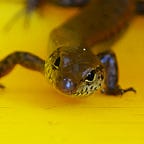If Looks Could…
The (un)natural history of Basilisks
On the few occasions I head south, I often follow the back roads down to the highway. I turn off at South Johnstone, with its sprawling sugar cane mill and low causeway across the river, and then drive through the banana farms, cane paddocks and rainforest. It has been a while since I have taken that road, so my memory might be hazy, but somewhere on the way is a sign that says BASILISK.
Although you will see pythons and cassowaries here, there are no basilisks. At least, no one has reported them. But then they wouldn’t. Basilisks are deadly.
The basilisk of the medieval bestiary was a terrifying beast. Part cockerel, part toad, part snake, all venom, the creature could kill with a deadly bite, or by noxious exhalation or lethal stare. The way to defeat a basilisk was to hold out a mirror — it was not immune to its own reflection — or to send a weasel into its lair. The weasel’s own noxious exhalations were too much for the beast. In that confined space, it was often too much for the weasel as well and both creatures expired. The crow of a cockerel was also dangerous to the basilisk. Sometimes it was fatal, but not reliably so.
Possibly the oldest surviving commentary on the basilisk as a danger to personal well-being is Nicander’s Theriaca, an instructional poem on venomous…
